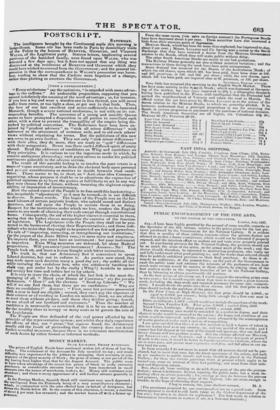PUBLIC ENCOURAGEMENT OF THE FINE ARTS.
TO THE EDITOR OF THE SPECTATOR,
London, July 1837. tin—I have been highly gratified by the perusal of some sensible remarks in the Spectator of the Orb instaut, relative to the prices given for the last pic- tures purchased by the Government for the National Gallery. It is evident that this is another of those jobbing concerns where the picture-dealers are allowed to pocket a heavy commission, which would not be tolerated if properly exposed, and the injurious effect on modern art and taste were properly pointed out. In purchasing pictures for the National Gallery, the question should not be so much the name of the artist, as the actual merit of the work ; and the choice should, therefore, be intrusted to meritorious professors, who really see and fully understand what good painting is; and the works thus selected should then be publicly exhibited plevious to their final purchase. As there is ob• viously an endeavour, at the present timt., on the part of the Government to exalt the public taste and advance the iiiteriAta of the professors of art, how much more certain would be success in those objects, by placing some of the best modern works in the superior branches of art in our National Gallery, than by labouring to obtain gatedionalele old masters. As the heat means of advancing art, I would suggest the awarding prizes on in two years ; for it would require about that time to complete a great historic work, including the deep study and research necessary for some epic composi- tions. I would divide the prizes into thine classes, and the first prize in each class ehould inclotte the purchase of the picture. In the First Class, or High Historic, the first prize should be 4,0001., or equal to 2.000/. per annum ; being little enough fur a first•rate man in the highest branch of art. Ditto, Atwood prize, 1,500/. ; which would not include the purchase of the work. Second Class. Familiar Life. First prize. 2 0001. ; second ditto, 500/. Third Class, Landscape. First prize, 2.000/. ; second, 500/. Thus, six eminent men would be rewarded in a moderate degree, and their choicest works would be secured to the nation ; the hopes and condition of our artists would be improved. and the public taste advanced by the contemplation of works produced a oder such a system of competition. I am quite satisfied that thew is at this moment as high a degree of talent in this our native land as in any country, ay, and any period of the world ; and I cannot but feel disgust at the cant of the stupid and ignorant. that our dull and heavy climate will not produce genius. lias the climate affected our MILTON, our Sit AKSPEAR our NEWTON, and a thousabd other demigods of power? If such is the case, it would be better to banish ourselves to Otalwite, where the air is more pore, and venires more expensive and free, and bid adieu to our na- tive land for ever.
In these remarks I do not mean to assert that old masters should not be par- chased, but to insist that none but the finest specimens of the artists, and such as are conducive to public morals and taste, b110011 he placed in the National Gallery ; for there are certain paintings there at present which ought to be turned out, some on account of then bad painting, and some from their inde- cent and disgusting nature. But, above all, have nothing to do with those pests of the arts the picture- dealers ; whose interference, besides injuring the public taste, has a most de- grading effect on artists generally ; for, coming as they do between the patrons and painters, there are many, even of the highest, who are.mean enough is truckle, in the hope of obtaining their support. I beg to remain, Sir, your obedient servant, M. J.
[The premiums proposed by our correspondent are on a grand scale. State encouragement is needed to call forth talent in the highest department of the fine arts; but who is to direct its application ? The first want, in relation to Government interference in matters of art, is a National Institute.)


























 Previous page
Previous page